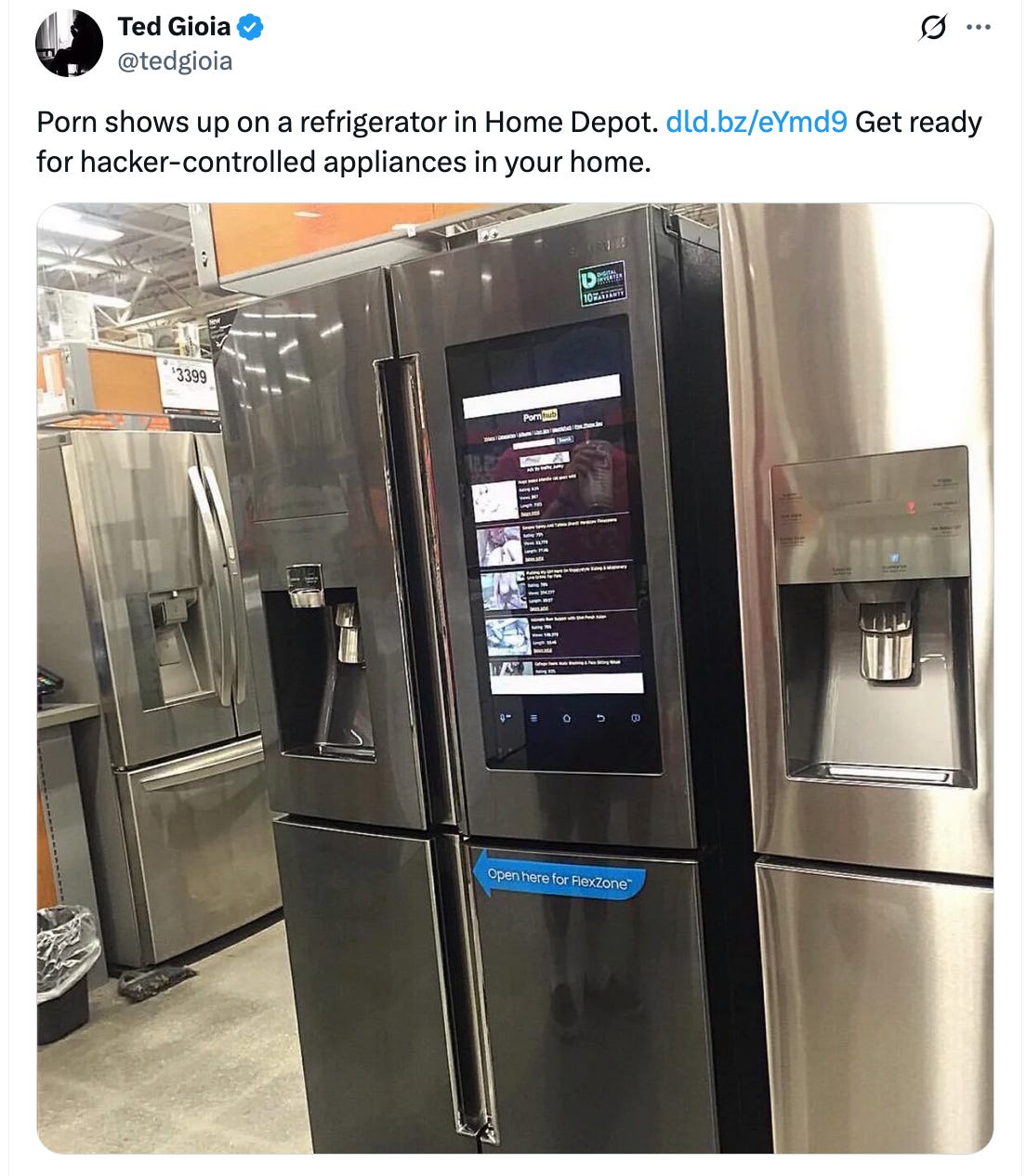No, I Don't Want Ads on My Refrigerator
This month the annoyance economy got much, much worse
What do English majors talk about in their spare time?
No, they don’t discuss Shakespeare. Or Chaucer or Milton. Or the four functions of the semicolon. Or even the seven types of ambiguity.
Nope, none of the above. When English majors get together they leave all those highfalutin concerns behind. Instead they have a bigger question on their minds:
How do I get a job with this lousy degree?
Please support The Honest Broker by taking out a premium subscription (just $6 per month).
That’s a puzzle even Shakespeare couldn’t solve. That’s why he skipped college—and went directly to the job of Immortal Bard. No degree required.
Ah, I’m sorry to report that they’re not hiring Immortal Bards nowadays, or even mortal bards with student loans. So what’s an English major to do?
In my day, there was a time-honored answer. I was told, over and over: Advertising.
“Go into the ad business,” wise elders told us. “The agencies still hire English majors—because they respect creativity.”
Respect creativity? Hah! Maybe that was true in the days of Don Draper and Mad Men. But not anymore.
Advertising is no longer about creativity and storytelling. Ads are now a matter of annoyance, plain and simple (as I recently described in this article).
It’s a simple concept. Web platforms force people to pay money to avoid the ads—so the more annoying they are, the more money they make.
They used to call it extortion—pay now to avoid pain later. And it always works like a charm. Needless to say you don’t need an English major to run an extortion business. (However, they do make good victims.)
This business strategy started out in media—where it made some sense. People are familiar with the idea of advertising during screen entertainment.
And here is how it played out:
YouTube started this with the launch of an ad-free tier in 2014.
Paramount announced an ad-supported subscription plan in June 2021.
Disney + launched a low-price subscription option with advertising in March 2024.
Netflix introduced a similar program in October 2022.
Amazon Prime did the same thing in early 2024.
But in the last few months, it’s gone crazy. The ads are spreading beyond movies and videos—and into almost anything with a digital interface. So we’ve seen the following in recent days:
Jeep drivers started complaining about ads on their vehicle touchscreen in early 2025. An ad for an extended warranty allegedly appears every time they stop their car (at a red light, etc.).
Meta announced an ad-free subscription option for Facebook and Instagram in September 2025. (initially in the UK).
Microsoft announced an ad-supported subscription plan for Xbox cloud gaming in October 2025.
A rumor about Apple inserting ads into its map app started spreading in October 2025. This will allegedly launch in 2026.
This is more than annoying—it’s also abusive. A new Jeep can cost $50,000 or more. When you hand over that much cash, you should get an exemption from spam ads on your screen.
But the most annoying move of all is coming from Samsung. They are putting ads on $3,499 smart fridges. They’re rolling out this “software upgrade” right now.
According to Samsung, your smart (or maybe smart-ass) refrigerator will soon share “useful day-to-day information such as news, calendar and weather forecasts, along with curated advertisements.” The display will change every ten seconds.
I definitely rely on my fridge for some things—milk, eggs, orange juice, and an occasional cold beer. But you don’t see curated advertisements on that list.
Ads will never be on the list.
People tell me that refrigerators were better in the 1950s. That seems impossible—but check out all the features on the 1956 Frigidaire model. You can’t get those nowadays. Instead you get aggravation and annoyance in big heaping helpings.
A few months ago, we purchased a new refrigerator. I didn’t know about the Samsung travesty back then. But I still knew enough to tell the sales dude: “I don’t want my refrigerator connected to the Internet.”
I had heard horror stories. Maybe you have too.
The sales dude wasn’t surprised. Like me, he just wants a nice cold one from his fridge. And the last I checked, that doesn’t require a wifi connection.
But this madness is spreading. You can now buy a smart toaster or smart microwave or smart kettle or smart coffee grinder—or even run your entire kitchen with a smart touchscreen hub.
The only thing that isn’t smart here are the people who buy these contraptions. Do you really need the Internet to toast your bread and heat up your water?
If you really want to get smart, you start by avoiding these appliances. Or—even better—you boycott the companies who annoy you with advertising on their screens.
If enough of us do that, they just might get they message. Maybe the ad agencies will go back to hiring English major—because they want to rediscover creativity. That would be a pleasant change.





“Curated advertisements” gets my vote for dystopian phrase of the day.
I think the weak point for the social media companies and the internet folks in general is one Ted's pointed out - people don't need these things. I mean NEED like you need a food, a fridge, transportation, a house, clothes, healthcare. Sure FB is a near-monopoly, but I left FB and my life is better. I just left LinkedIn because it was nearly pointless and hugely annoying. I like but don't need Disney Plus, so I left. (My kids don't know that yet, yikes!). I don't need these things. Most of them I no longer even want.
Best advice I got in a long-time was from my chill and wise brother-in-law: don't buy a smart appliance, ever. Endless software upgrades and compatibility issues. On top of it, this crap.